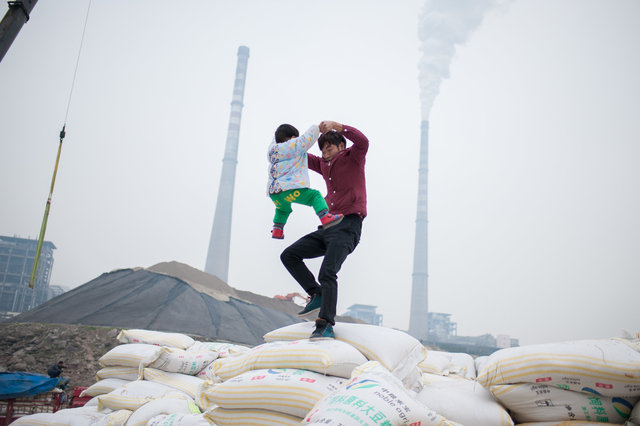
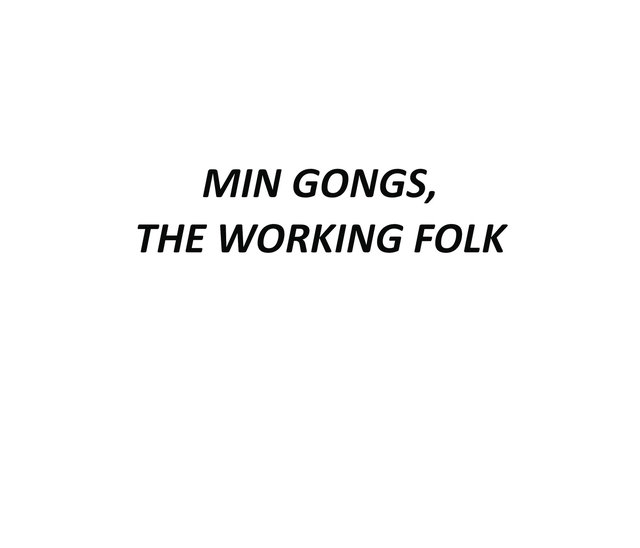
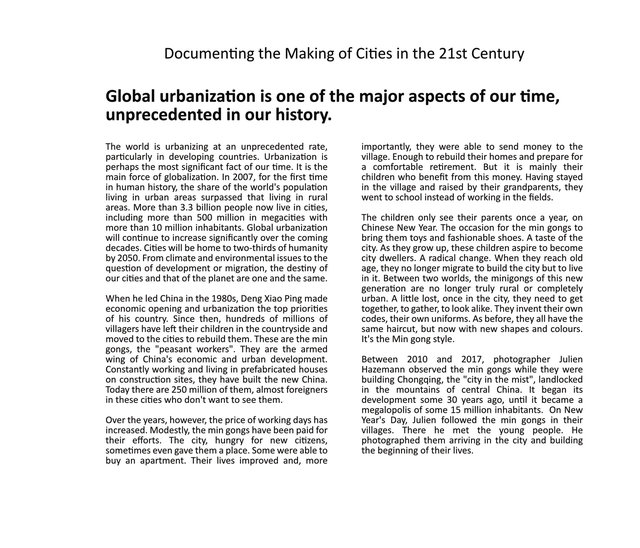
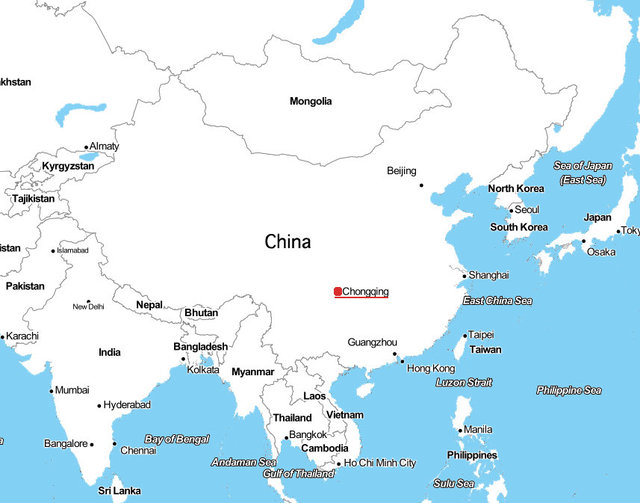
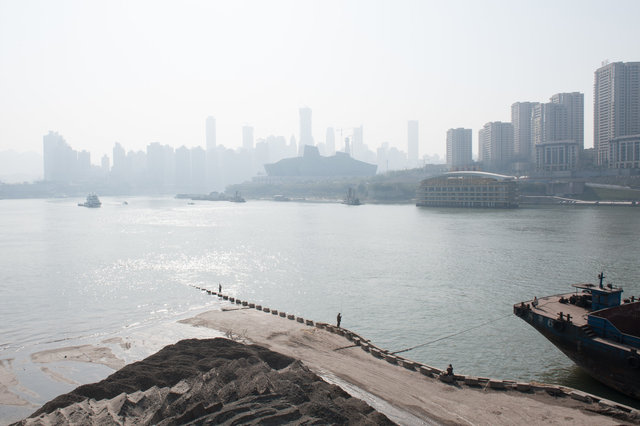
Residents of Chongqing fishing in the Yangtze in front of the city's new opera house and the skyscrapers of Jie Fang Bei.
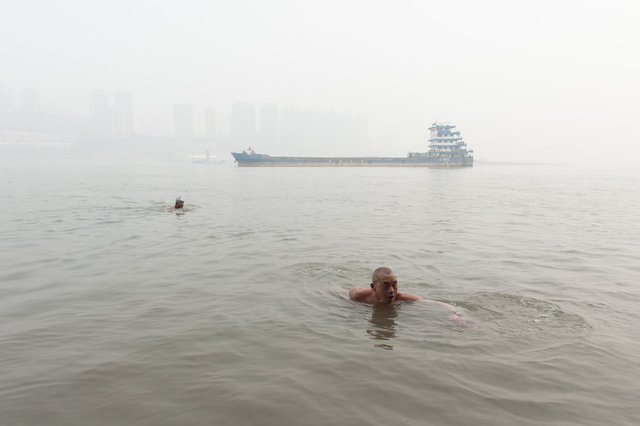
True to tradition, Chongqing residents swim in the Yangtze River, the country’s main river. In the fifties, Mao already bathed at the same spot.
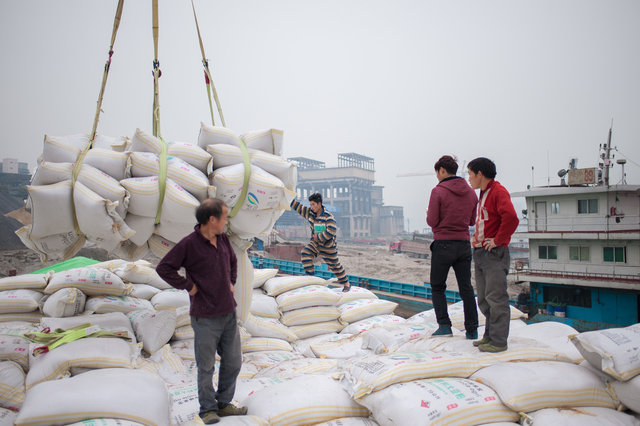
The Yang brothers (centre) supervise the unloading of the grain cargo they have transported to Chongqing. The Yang family went into debt four years earlier to buy the barge. They live on it and travel the Yangtze River between Chongqing and Shanghai with the cargo they carry.
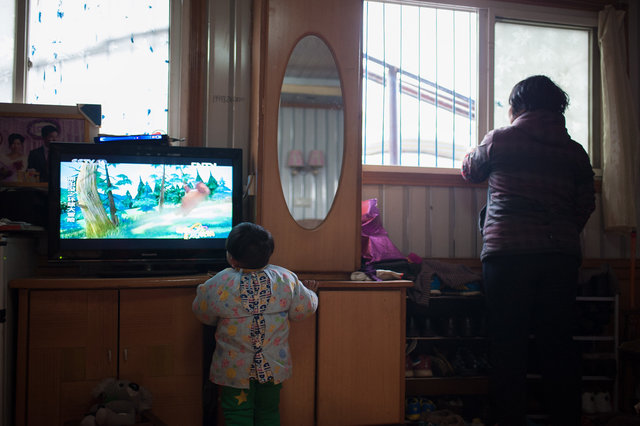
Grandmother Yang and her grandson in her room after a nap. When he will be three years old and old enough to go to school, grandparents Yang will return to live in their village with him and leave the boat to their sons.
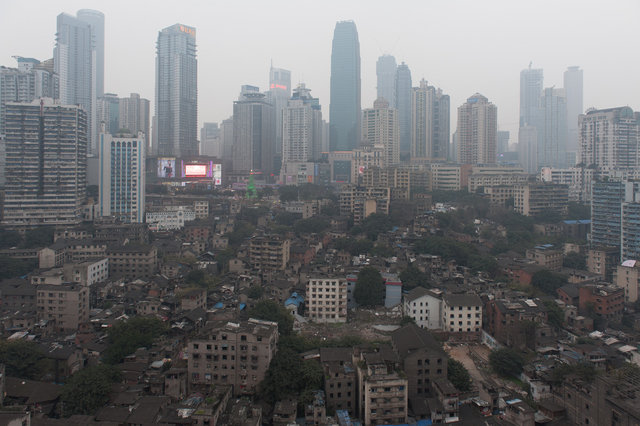
In the foreground, the Shi Ba Ti district (in 2013), overlooked by the skyscrapers of Jie Fang Bei. The construction of these buildings monopolized thousands of min gongs. Shi Ba Ti, the historic centre of Chongqing, has since been demolished.
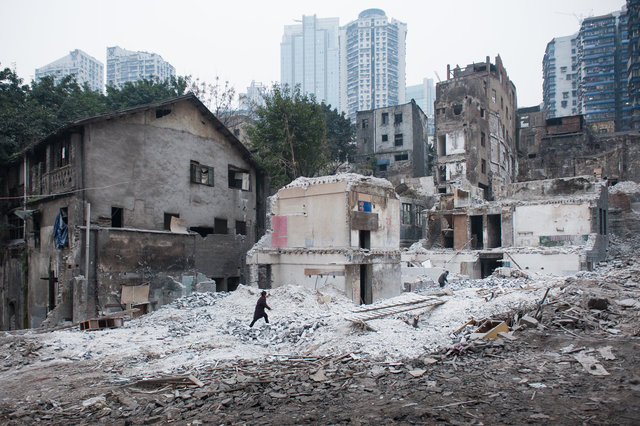
Buildings being destroyed in Shi Ba Ti, 2013. Shi Ba Ti was the historic heart of Chongqing, and one of the last old neighborhoods to be demolished. Rather than a heritage site, Shi Ba Ti was seen as a symbol of the underdevelopment that its inhabitants were in a hurry to leave in order to integrate into modern China. Since then, the neighbourhood has been razed to the ground.
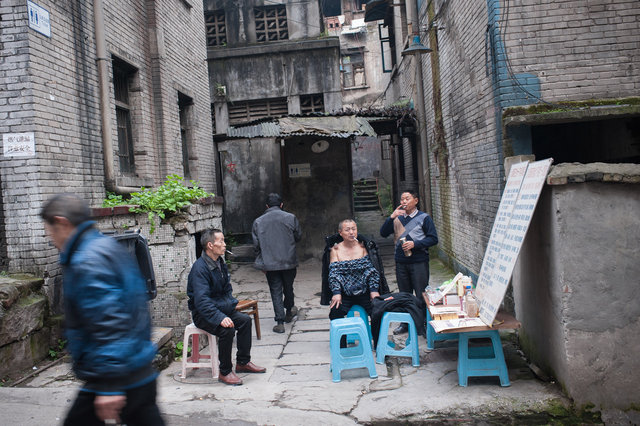
A healer puts suction cups on the back of one of the last inhabitants of Shi Ba Ti in 2015. The demolition of Shi Ba Ti took several years. Its inhabitants were gradually relocated to new apartments.
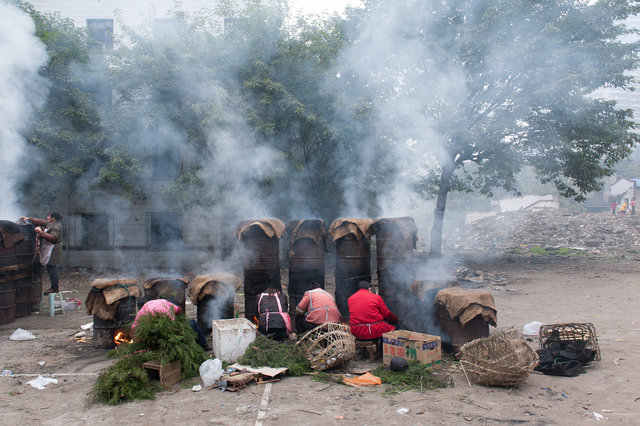
Women in the midst of preparations for the Chinese New Year’s celebrations are smoking sausages in the courtyard of a former school of Shi Ba Ti that is destined to be demolished.
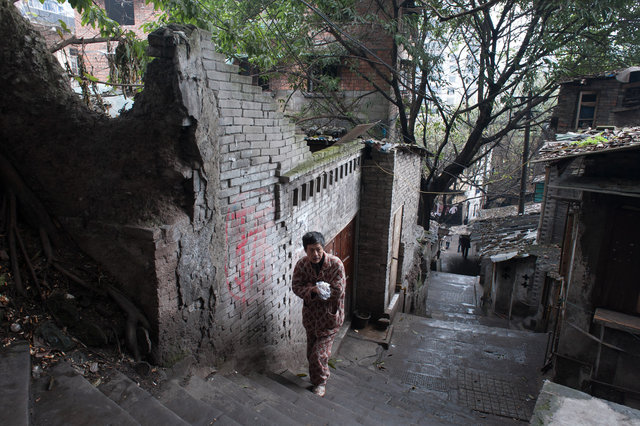
One of the last inhabitants of Shi Ba Ti.
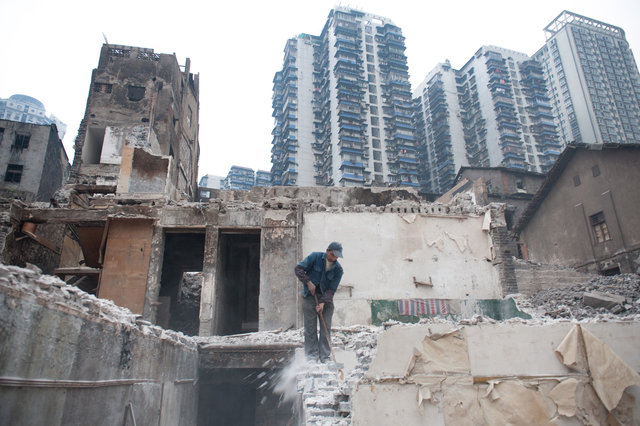
Li Jiabao demolishing an old house in the Shi Ba Ti district. Li Jiabao is a migrant “peasant worker”, who comes from Guanguan, Deng Xiao Ping’s native village, in the Sichuan Province.
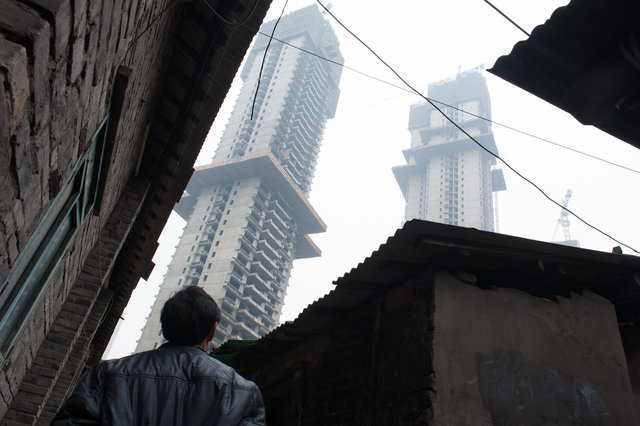
An inhabitant of the Danzishi port district, in front of Shi Ba Ti, watches towers growing.
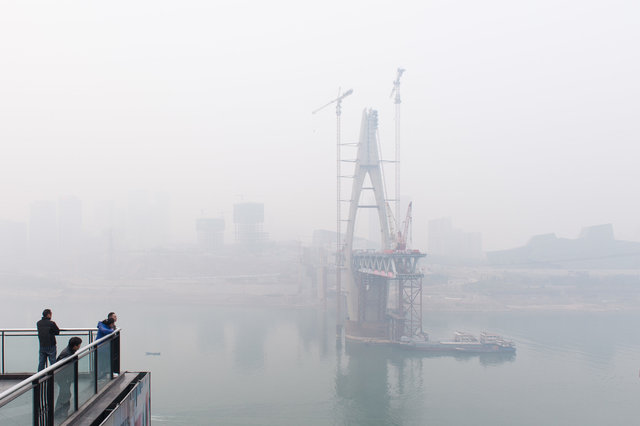
The Hanghuayuan Bridge in the midst of construction, in 2013. Its inauguration, along with that of a new subway line, occurred one year later. In 1990, four million people was living in Chongqing. By 2020, there are nearly 16.
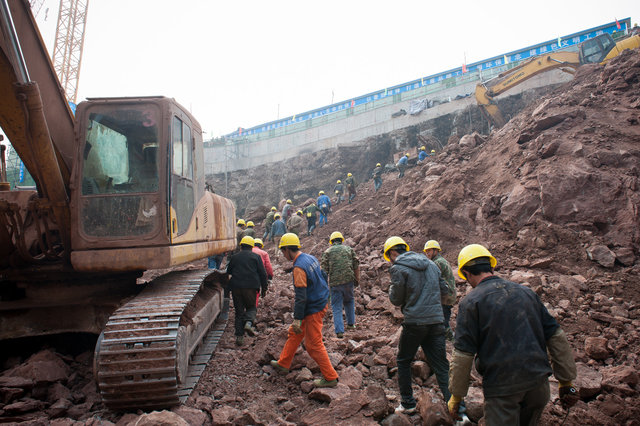
Min-gongs working on a construction site in Yuzhong district, near Shi Ba Ti. Since the 1980s, the min gongs have been the mainstay of China's economic and urban development. There are now estimated to be more than 250 million, most of them working on construction sites and in factories.
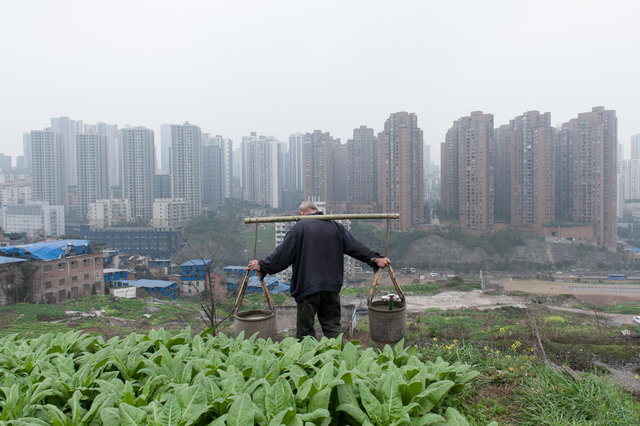
A peasant working on his field, facing the towers of Nan'an district, in the middle of Chongqing. Chongqing's expansion has taken place by absorbing villages and much fertile farmland.
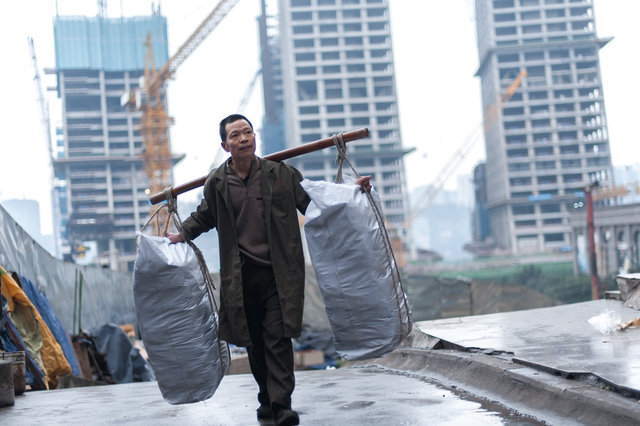
Li Wenyin transports goods in the Chaotianmen district. Li Wenyin, a fifty-three-year-old min gong, has been working as a bang bang, the porters of Chongqing, since he left his village twenty-five years ago. The bang bangs are disappearing, replaced by modern logistics networks.
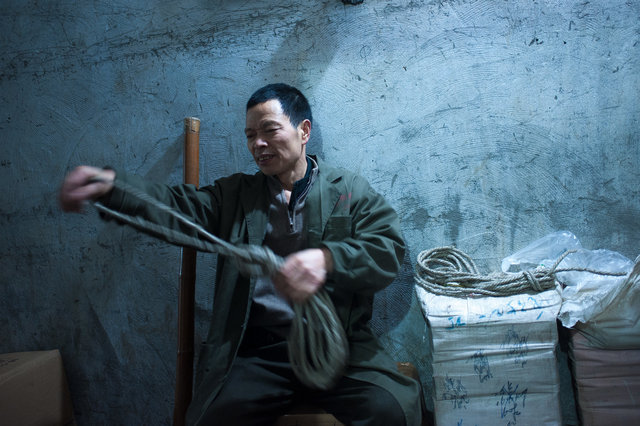
Li Wenyin prepares his "bang", the bamboo stick he uses to transport goods. The bang bang trade is one of the lowest on the social ladder. Only min gongs still accept to do it.
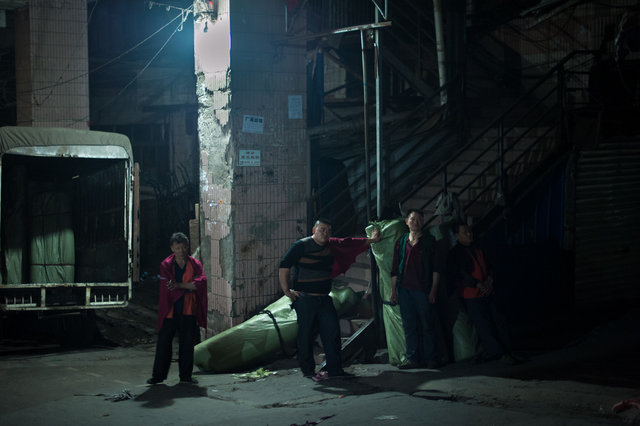
Bang bangs in Chaotianmen waiting for a truck to arrive to unload it.
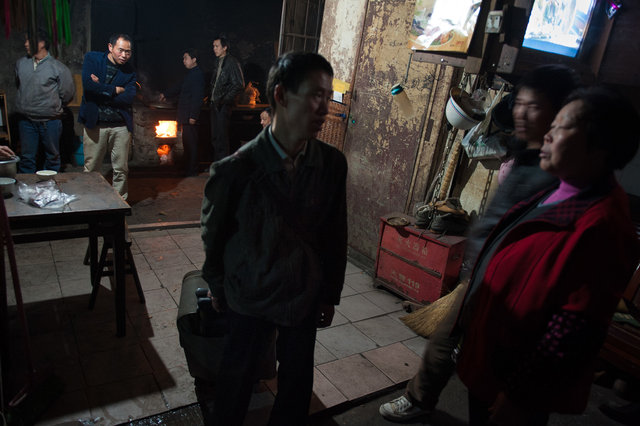
As soon as it arrived in Chongqing, a min gong asks for a romm at the Old Lady Hostel ("the Laotaipo Hostel") at Shi Ba Ti, where the night costs seven kwais, the price of a bowl of noodles on the street.
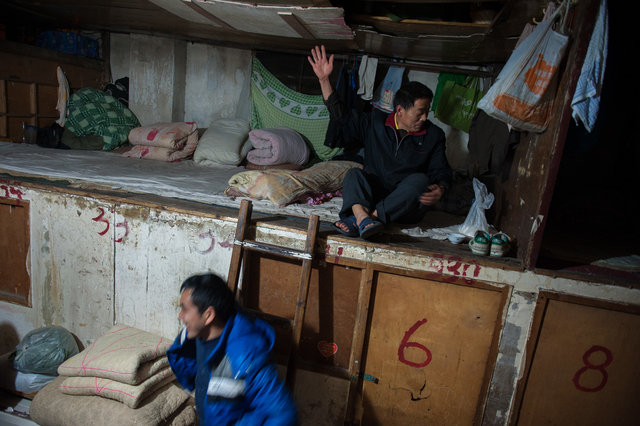
Two min gongs are getting ready to sleep in the dormitory of the Old Lady Hostel ("Laotaipo Hostel") in Shi Ba Ti, where the night costs seven kwais, the price of a bowl of noodles in the street. Since most inhabitants left Shi Ba Ti, many buildings have been transformed into hotels / dormitories, turning the neighbourhood into one of the “gateways” to the city for min gongs.
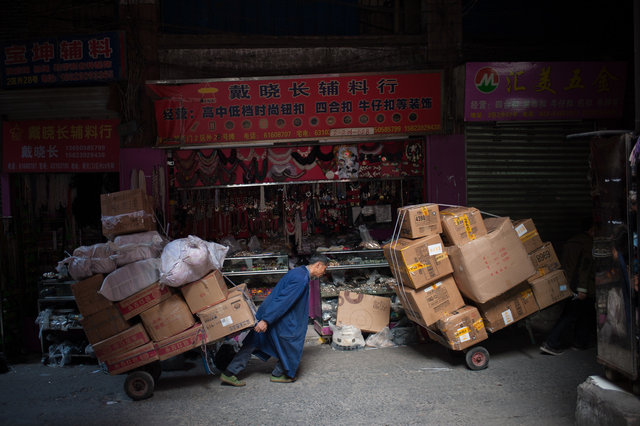
A min gong working as a "bang bang" delivers goods in the Chaotianmen shopping district.
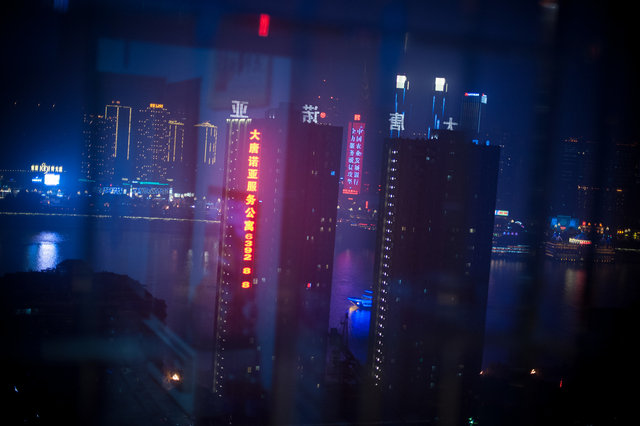
View on the Yangtze River at night from Wenyin’s apartment, the bang bang Li. Wenyin’s neighborhood is undergoing a deep transformation, and an increasing gentrification. It is the heart of Chongqing.
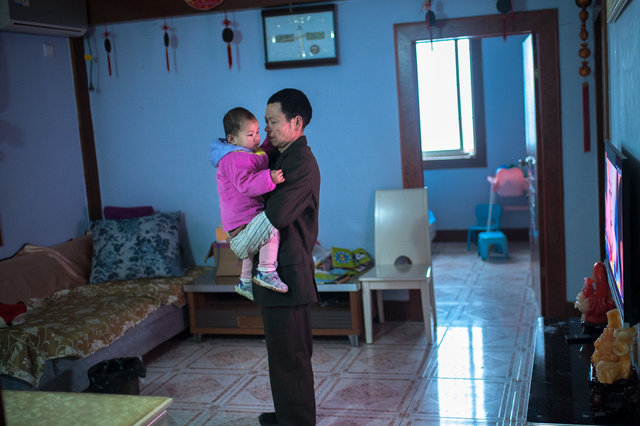
Li Wenyin with her granddaughter Ruoyou. He lives with his wife, son, daughter-in-law and granddaughter in the apartment he bought six years earlier, when his son got married. It will take him twenty years to pay it back. When he will retire, he plans to let it to his son and return to Guangan, his home village.
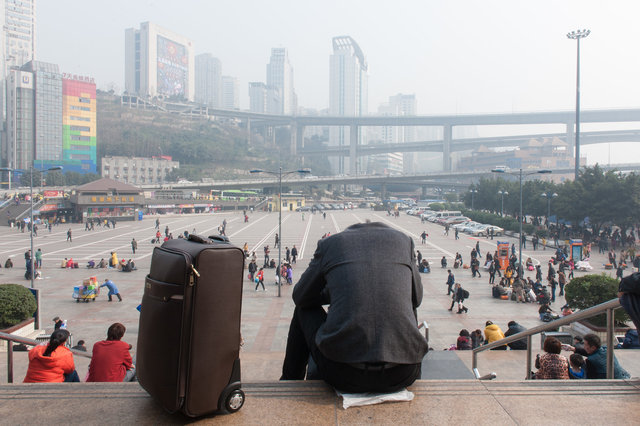
A min gong at the Caiyuanba railway station in Chongqing before taking a train to his village for the Chinese New Year ceremonies. At the Chinese New Year's Eve, everybody goes back to their families. For the min gongs, it is the only opportunity in a year to return to the village and take a few days of rest. For a few days, the trains, buses and planes of the country fill up with several hundred million people. It is considered to be the largest transhumance in human history.
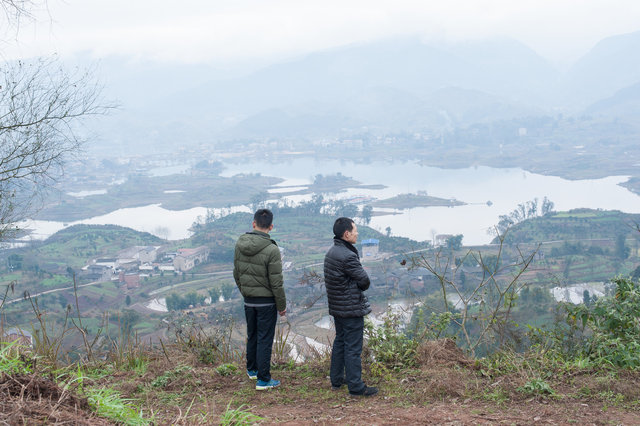
Li Wenyin in Guangan, his native village, with his nephew during the Chinese New Year celebrations. Wenyin only returns there on this occasion, once a year. It is the only time he can rest and be reunited with his family. The income he earns from his work in Chaotianmen allows him to live much better than the peasants left in the village. When he will retire, he plans to move back to Guangan. Guangan, in Sichuan, is the native village of Deng Xiao Ping, who ruled China from 1978 to 1992 and launched the great policies of economic opening and urbanization of his country.
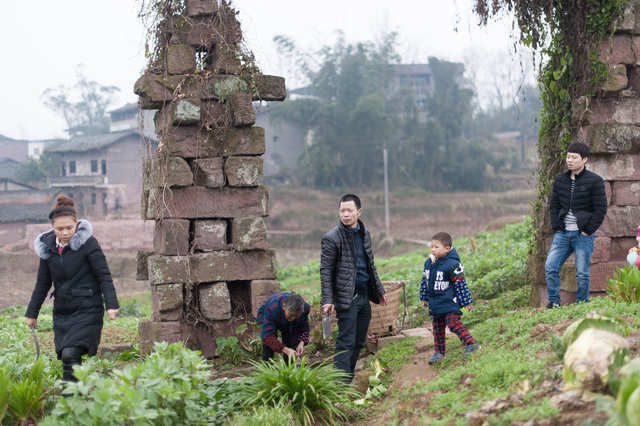
Li Wenyin and his family on his plot of land in Guangan, his native village during the New Year celebrations. Wenyin arrived in Chongqing in the nineties at the age of about thirty. Until then, he had only worked the land. The income he earns from his work in Chaotianmen allows him to live much better than the peasants left in the village. When he will retire, he plans to move back to Guangan. He still feels like a peasant.
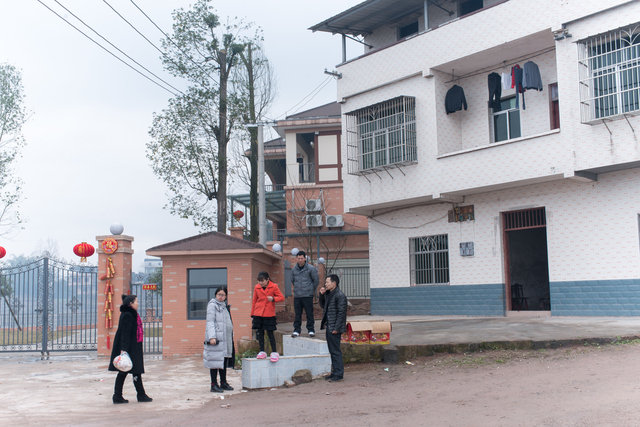
Li Wenyin and some members of his family on the porch of his house in his home village of Guangan. He had it rebuilt with the money earned by working in Chaotianmen as bang bang. This is where he plans to spend his retirement. He now occupies a good position in the village.
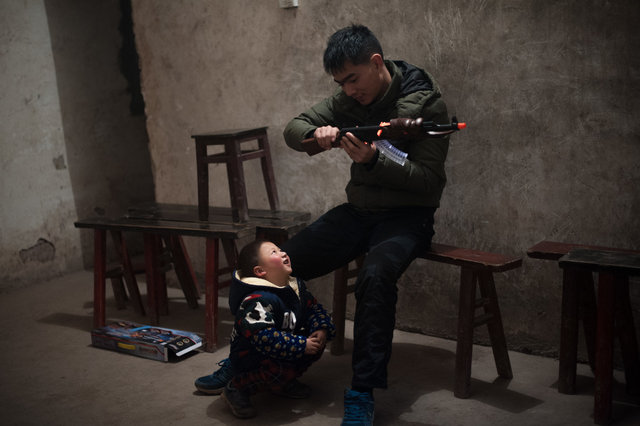
Li Gan, Li Wenyin's nephew, playing with Liu Sijiie in the family home in Guangan. Every year, Li Wenyin brings toys, clothes and a taste of the city to the children, most of whom stay in the village all year round with their grandparents.
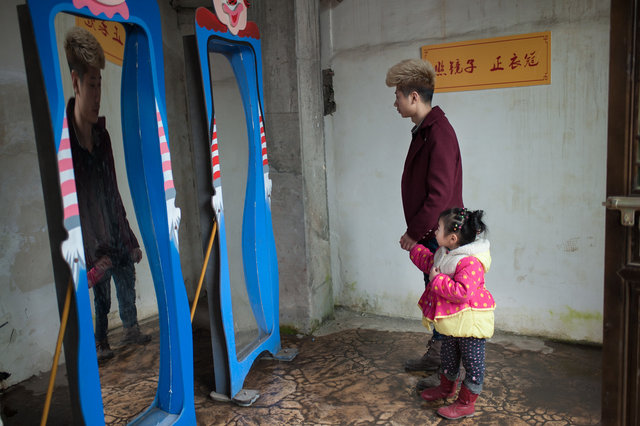
He Long and his daughter Ying at the Guangan amusement park. Ying lives in the village with her grandparents. She only sees her father once a year, on New Year's Day. He is almost unknown to her. He Long's parents were also min gong before they retired and took care of Ying. He was also raised by his grandparents. Today, he doesn't share much with his parents.
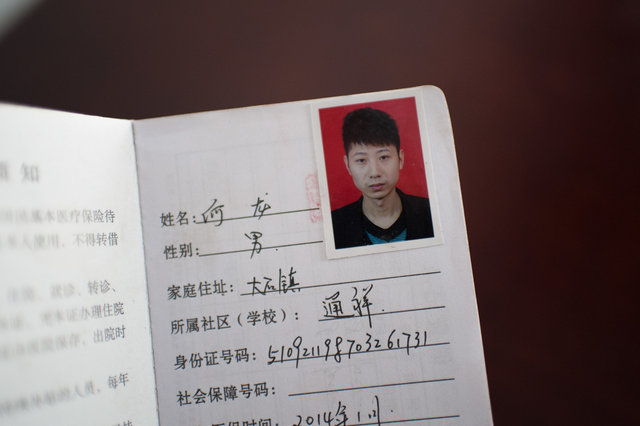
He Long, a young min gongs’, hukou. The hukou is a passport linking every Chinese citizen to his place of residency, offering specific rights and access to certain public services. The min gongs possess rural hukous that denies them numerous urban rights, such as free access to public schools for their children. However, holding rural hukou is necessary to have access to land. The system of the hukous doesn’t prevent the min gongs from moving elsewhere in the country, and finding work in the cities, but it makes it difficult for them to consider future family life plans there.
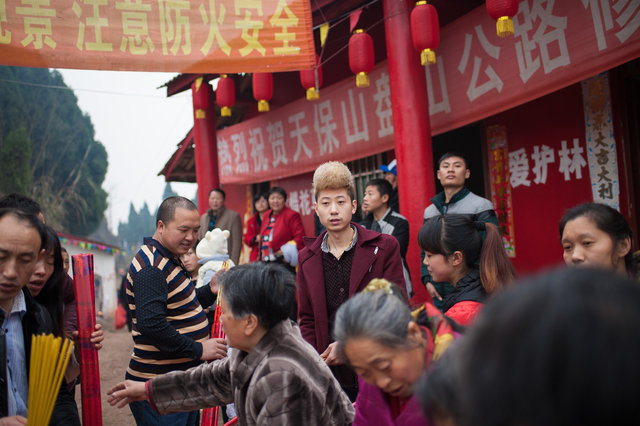
He Long at the Chinese New Year celebrations in Guangan, his home village. He Long is a hairdresser in Chongqing. He left Guangan at the age of seventeen.
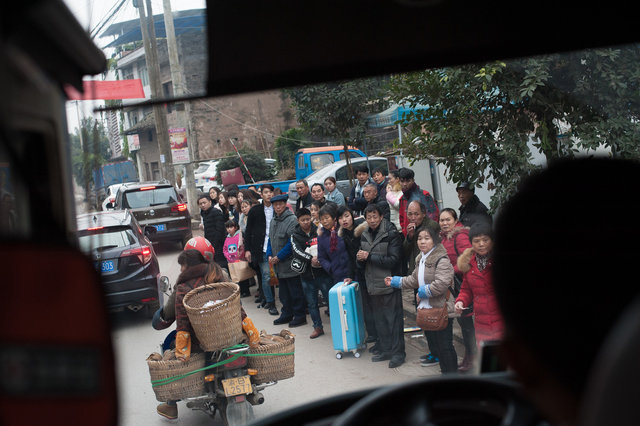
Min gongs waiting for the bus to return to Chongqing after the Chinese New Year celebrations.
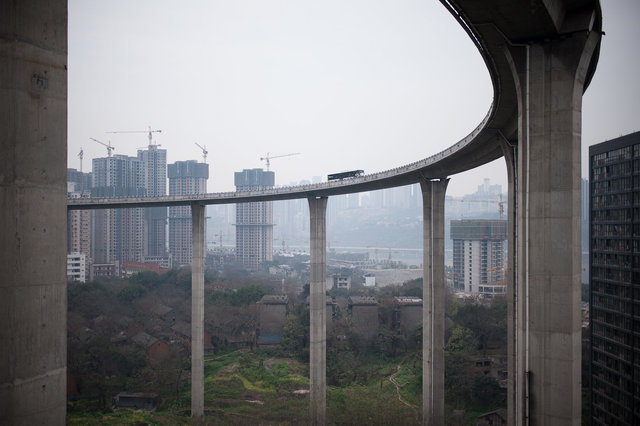
A motorway interchange in Nan' an district, in central Chongqing.
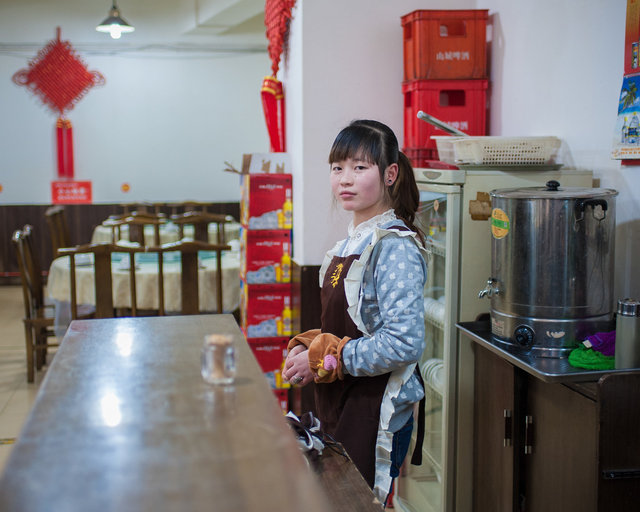
Li Beina in the restaurant where she has been working for the past six months, when she arrived in Chongqing from her home town in Sichuan.
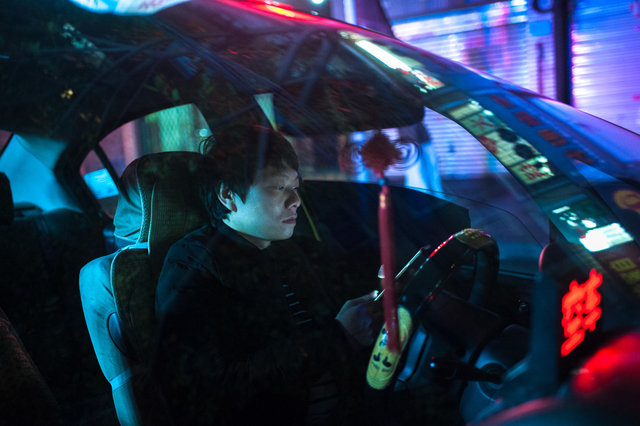
Li Xin at the wheel of her taxi. Li Xin is the son of Wenyin, the bang bang. He has been a driver for six years. He started working nights a year earlier to earn a bit more money. He's tired of doing this job and doesn't know what else to do, but doesn't imagine becoming bang-bang like his father.
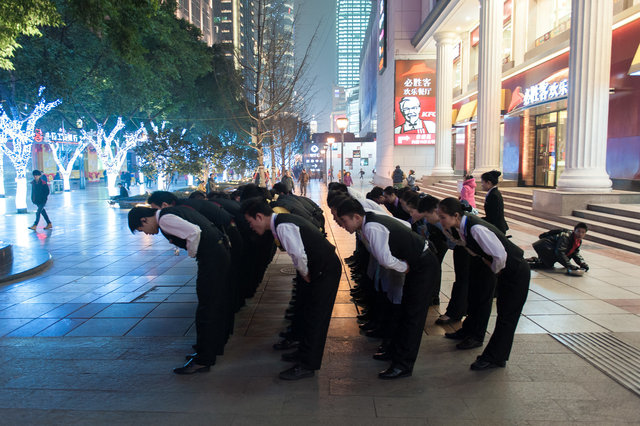
Employees of one of Jie Fang Bei's Pizza Hut when they take their shift. Rural youth prefer waiter or cook jobs to work on construction sites, which are more tiring and messy. Further away also from the city lights.
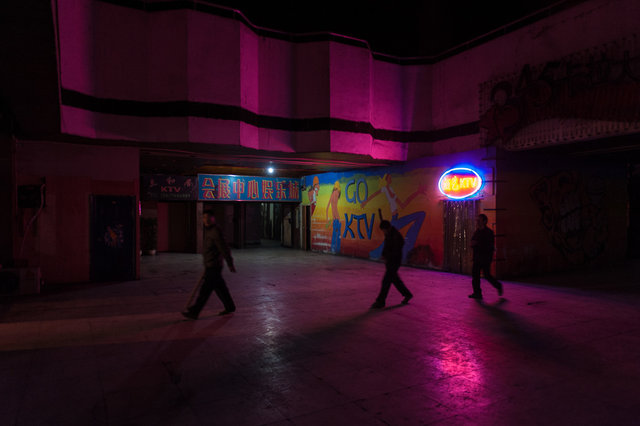
Three min gongs pass in front of a KTV at night.
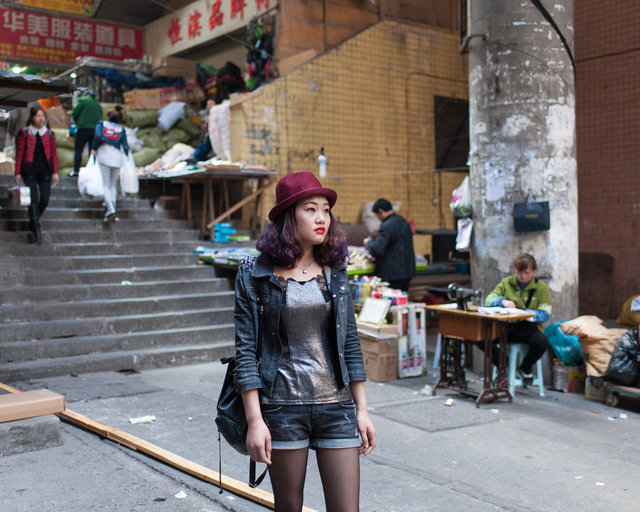
Lily in the shopping district of Chaotianmen where she came to buy wholesale clothes. Lily had left her small town in Sichuan province four years earlier. She wants to "be a part of Chongqing," but she still finds it difficult to feel at home there.
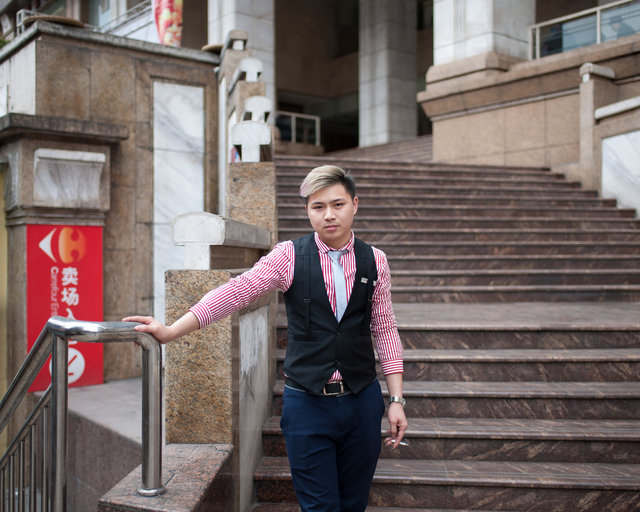
Jiang Xiaomin during his cigarette break. He is a hairdresser in a salon in the Shapingba district. He comes from a rural town in Sichuan. He arrived in Chongqing at the age of sixteen and immediately became an apprentice in a hairdressing salon.
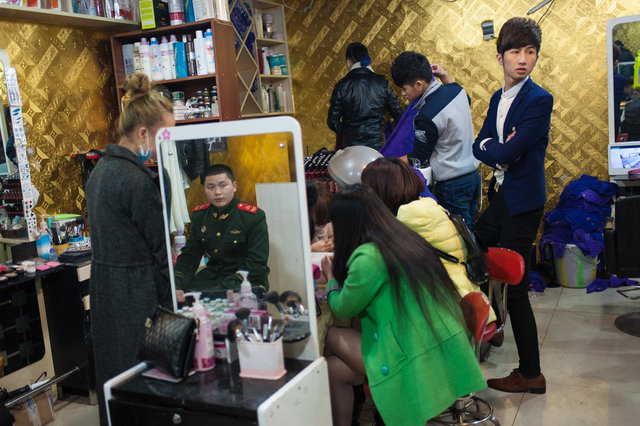
He Long's hairdressing salon in the early evening is a meeting place for Jie Fang Bei's trendy young min gongs, most of whom work in KTV and dance clubs in the neighborhood.
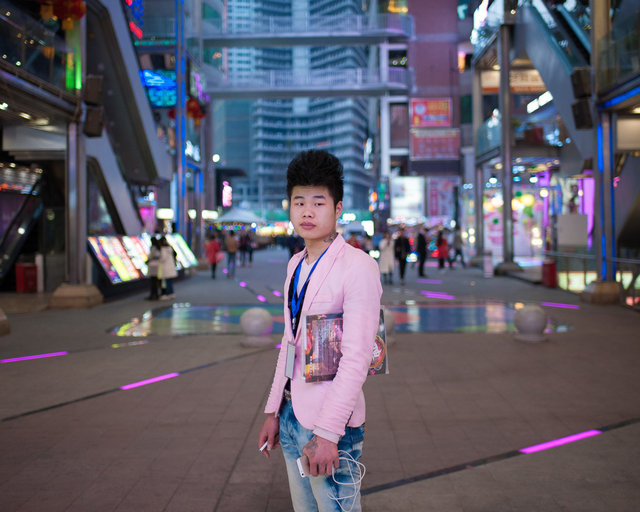
Shi Kun goes to work. He is employed in one of the dance clubs of the Deyi fashion mall, a shopping center that young rural and trendy migrants like him frequent a lot.
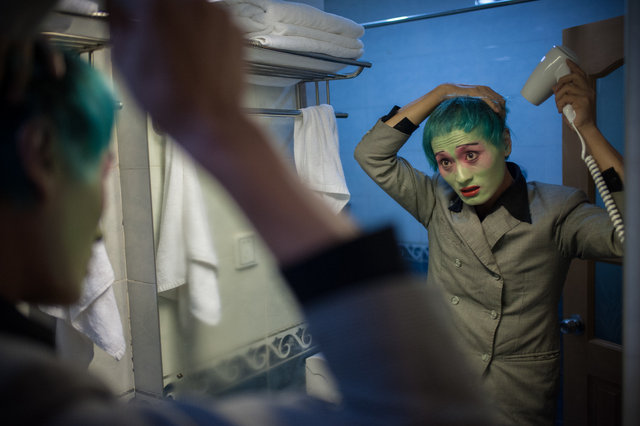
Mang Juan, the singer of the Demolition Moon, getting ready for a show during the band's tour. Mang Juan left his village in north-eastern China at 18 years old for the city of Dalian, then Beijing where he was a hairdresser for more than ten years. Knocked out by the whirlwind of development, he gave it all up to get into music.
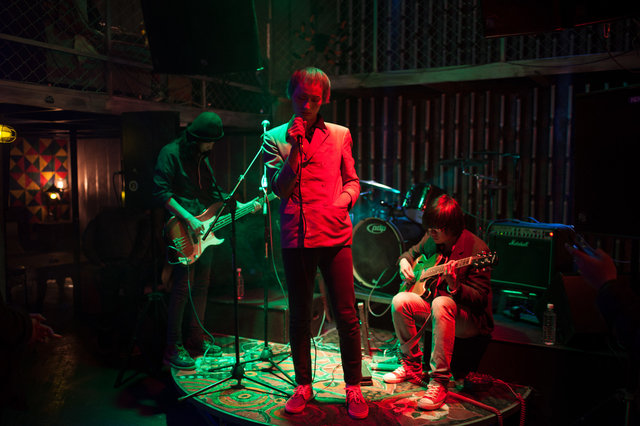
Mang Juan and the Demolition Moon during a show.
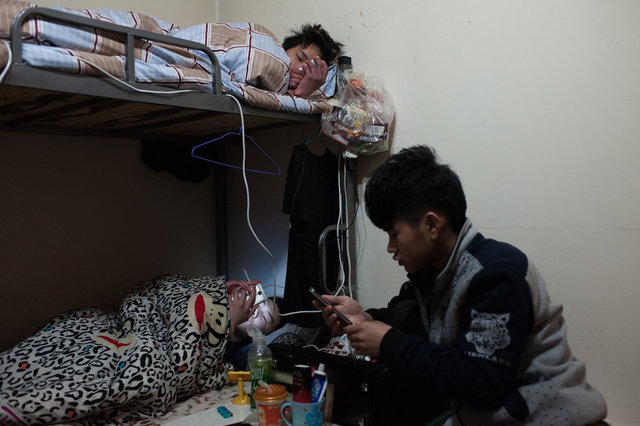
Wang is seventeen years old. He and his two colleagues work in He Long's hairdressing salon. In addition to the salary that Long pays them, he gives them lodgings. The apartment is one of the symbols of modern city life. It is a considerable improvement compared to the rural living conditions, but also compared to the prefabricated houses on the building sites where their parents lived.
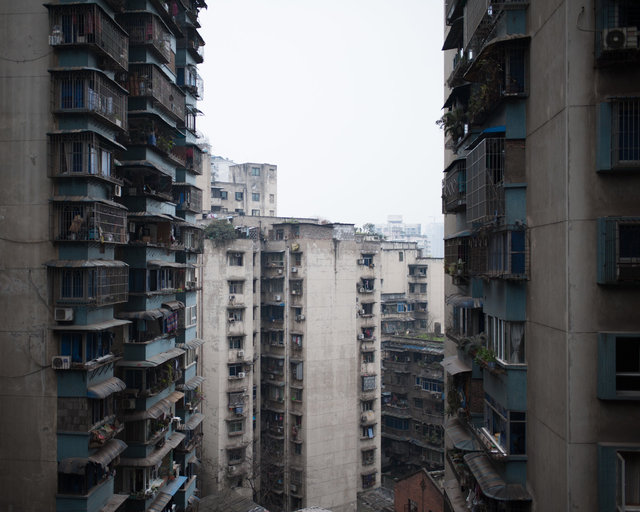
In thirty years, tens of thousands of towers mushroomed in the city of Chongqing, that had only known wooden houses without running water. And yet, the contrast with the rural areas is even more striking. For the young min gong, it is a radical jump into modernity.

A min gong in a street in Chongqing.
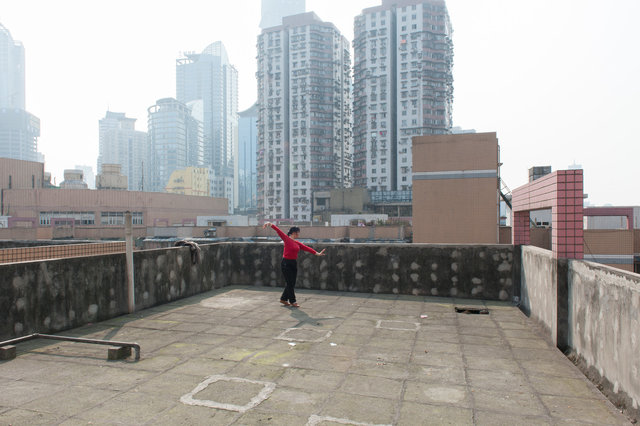
A Chongqing resident practices dance moves on the roof of her building where live min gongs and city dwellers.
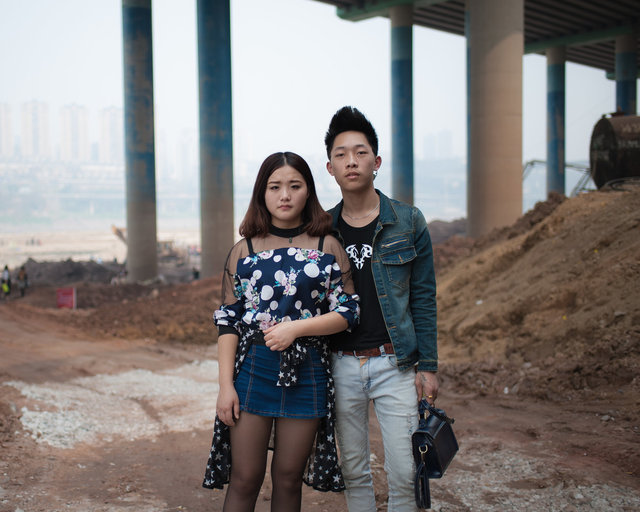
Xuan Xuan and Hu Zhongjian are employed in a hotel in Chongqing. They're min gong's children. They met in the village they came from. Their parents' dream is to have a beautiful retirement in the countryside. Theirs is a family life in the city.
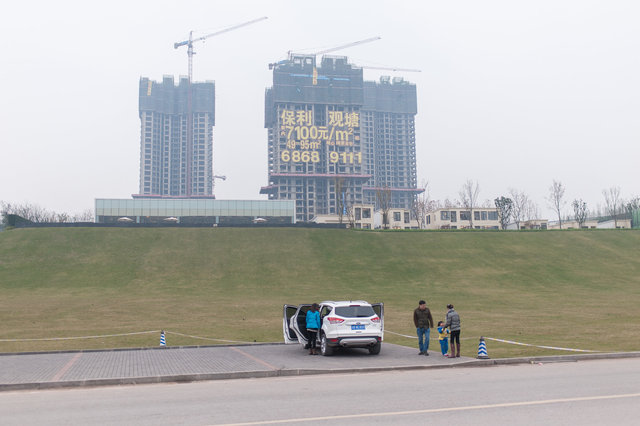
A middle-class family comes to visit their future apartment in the complex where He Long bought his on plan.

A young couple is photographed before their wedding in front of Chaotianmen, in full transformation. Organizing a wedding is expensive, often the equivalent of several years' salary. Family and marriage are among the strongest institutions in China, at a time where everything is changing.
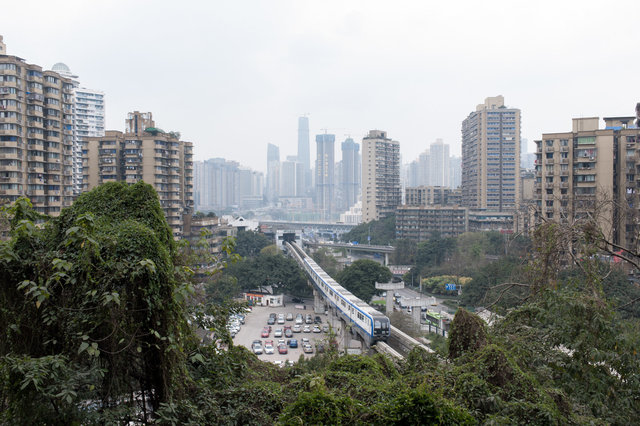
The Daping district, which marks the beginning of the Jiolongpo district. Jiolongpo was a highly industrial area. Its transformation and urbanization has been intense in recent years. Towers have replaced state-owned factories. The working class that lived there has disappeared. The workers converted to commerce, often with success.
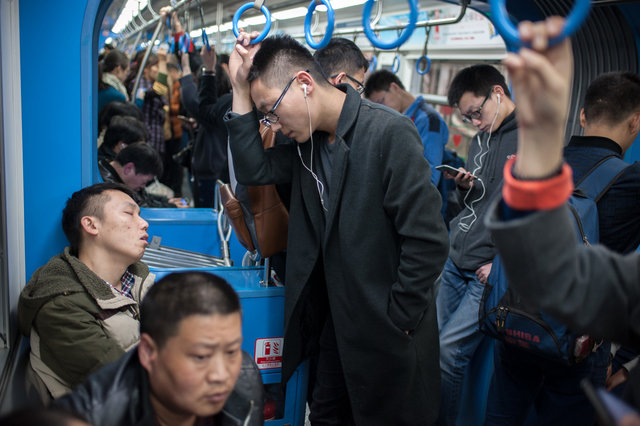
Leo in the subway, back from work. Leo spends several hours a day in transport. He is from a village, but he was nevertheless able to go to college and thus be offered prospects unimaginable for his parents at his age. This does not prevent him from continuing to feel like a peasant, he does not particularly want to in the city all his life. But being in Chongqing allowed him to move away from his parents who expect him to marry and have children. He values his independence.
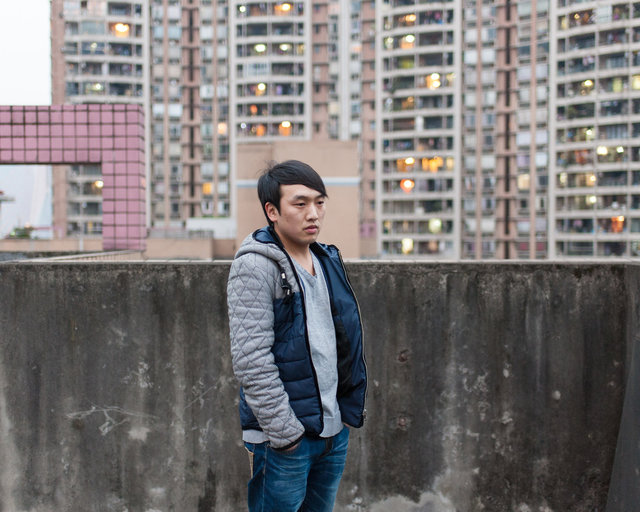
Chen Shuang arrived in Chongqing at the age of sixteen. After taking on a series of odd jobs, he opened his own clothing shop at the age of 26. He earns a good living and bought an apartment by going into debt for twenty years. He plans to apply to transfer his hukou to Chongqing. But he misses the countryside.
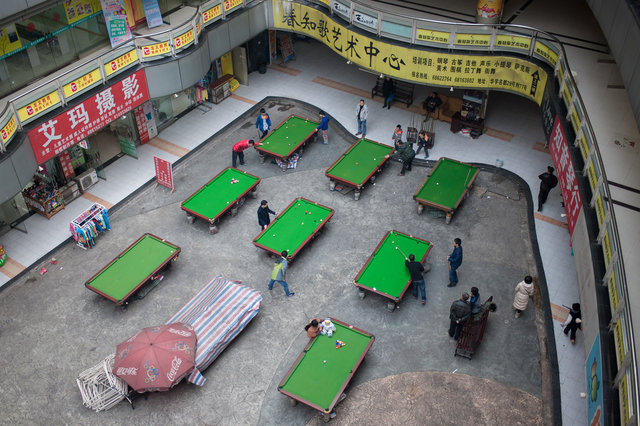
Rural and urban youth playing pool in an old-fashioned shopping mall in Chongqing.
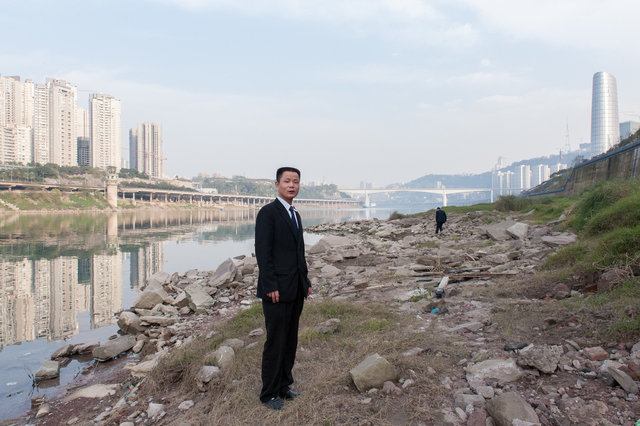
A walker explores the new Tiandi district in the middle of a construction site on the banks of the Jialing River.
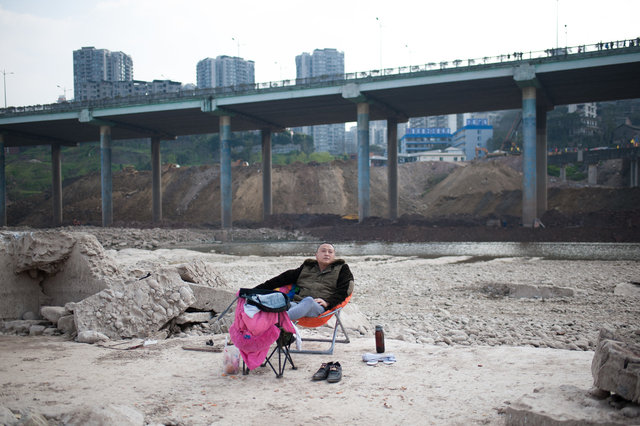
A Chongqing resident lounges on Ciqikou beach on a spring Sunday.
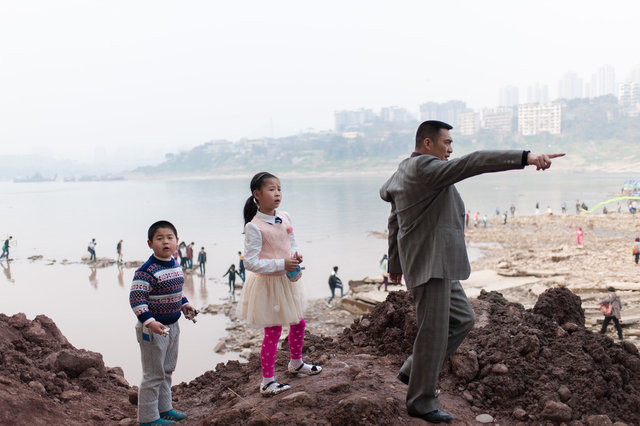
On a Sunday of spring, a middle-class family is headed to Ciqikou Beach, located at the heart of Chongqing and destined to become its “Malibu”.
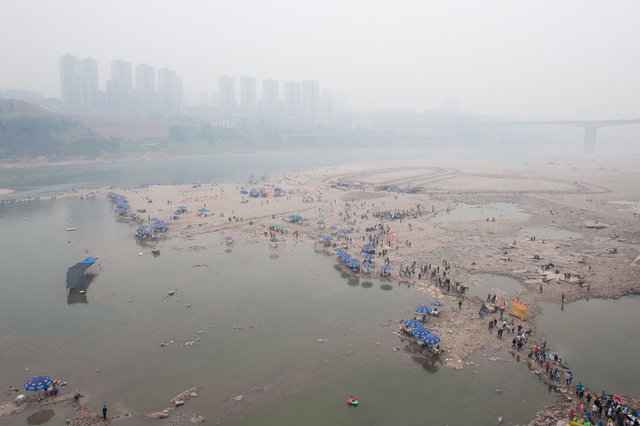
Ciqikou Beach on a Sunday. Every year in the spring, when the water level drops, the beach appears for a few weeks. It is right in the middle of the city.
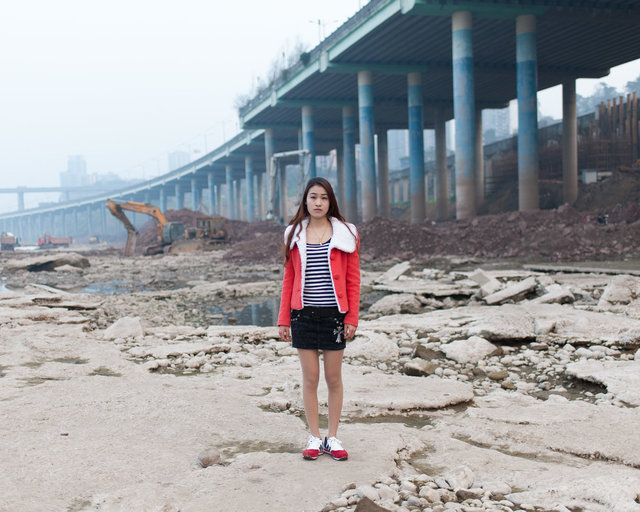
Chen Xue comes to Ciqikou beach on Sundays with her sister and friends. She has her own restaurant. She's a young min gong. Her parents, who were also min gongs, returned to their village for retirement. Xue does not intend to return to live in the village when the time will come to retire.
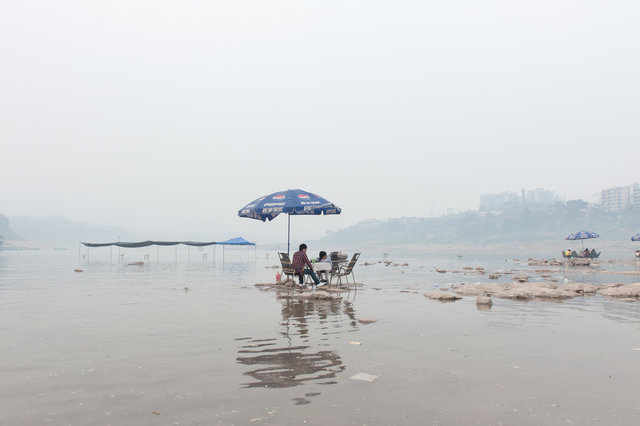
A Sunday at Ciqikou Beach.
